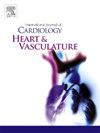Tricuspid regurgitation and chronic kidney disease in patients with cardiogenic shock: Review of the literature and real-world experience from a single center
IF 2.5
Q2 CARDIAC & CARDIOVASCULAR SYSTEMS
引用次数: 0
Abstract
Introduction
Chronic kidney disease (CKD) frequently complicates Congestive Heart Failure (CHF) and can worsen outcomes in cardiogenic shock. Tricuspid Regurgitation (TR), by elevating central venous pressure, may exacerbate renal impairment. Limited data exist regarding CKD’s influence in TR interventions. This study assesses the impact of CKD on survival and explores RV dysfunction as a potential mediator in patients with TR in cardiogenic shock.
Methods
We retrospectively analyzed patients admitted with HF-related or myocardial infarction-induced cardiogenic shock (2021–2025). Patients were stratified by TR severity (none/trivial, mild, moderate, severe) and CKD stage. Echocardiographic, laboratory, and hemodynamic data were collected. RV dysfunction was assessed using echocardiography and right heart catheterization. Survival outcomes, including HF readmissions and mortality, were evaluated using Kaplan-Meier analysis and Cox regression, considering predictors significant at p < 0.10.
Results
Among 177 patients (median age 70 years, EF 35 %, 46 % Black), 55 % had CKD. TR severity distribution was: none/trivial 42 %, mild 16 %, moderate 22 %, and severe 20 %. Severe TR significantly increased in-hospital mortality (40 %) compared to non-severe TR (24 %) and correlated with worsening CKD stages. HF readmissions within 12 months occurred in 10 % of patients. Older age and RV dysfunction emerged as the strongest mortality predictors. Severe TR independently increased mortality and readmission risk.
Conclusion
Severe TR significantly worsens survival in cardiogenic shock patients, especially those with advanced CKD, mediated by RV dysfunction. CKD severity assessment may enhance patient stratification for valve interventions. Randomized studies are required to further validate these findings.
心源性休克患者的三尖瓣反流和慢性肾脏疾病:文献综述和来自单一中心的实际经验
慢性肾脏疾病(CKD)经常并发充血性心力衰竭(CHF),并可加重心源性休克的结局。三尖瓣反流(TR),通过提高中心静脉压,可能加剧肾脏损害。关于CKD对TR干预的影响的数据有限。本研究评估了CKD对生存的影响,并探讨了RV功能障碍作为心源性休克中TR患者的潜在中介。方法回顾性分析入院的hf相关或心肌梗死性心源性休克患者(2021-2025)。患者按TR严重程度(无/轻微、轻度、中度、重度)和CKD分期进行分层。收集超声心动图、实验室和血流动力学数据。使用超声心动图和右心导管检查右心室功能障碍。生存结果,包括心衰再入院率和死亡率,采用Kaplan-Meier分析和Cox回归进行评估,考虑p <显著的预测因子;0.10.结果在177例患者中(中位年龄70岁,EF 35%, Black 46%), 55%患有CKD。TR严重程度分布为:无/轻微42%,轻度16%,中度22%,重度20%。与非严重TR(24%)相比,严重TR显著增加住院死亡率(40%),并与CKD分期恶化相关。10%的患者在12个月内再入院。年龄和右心室功能障碍是最强的死亡率预测因子。严重的TR单独增加了死亡率和再入院风险。结论严重的TR明显恶化心源性休克患者的生存,特别是晚期CKD患者,其介导的RV功能障碍。CKD严重程度评估可以加强患者瓣膜干预的分层。需要随机研究来进一步验证这些发现。
本文章由计算机程序翻译,如有差异,请以英文原文为准。
求助全文
约1分钟内获得全文
求助全文
来源期刊

IJC Heart and Vasculature
Medicine-Cardiology and Cardiovascular Medicine
CiteScore
4.90
自引率
10.30%
发文量
216
审稿时长
56 days
期刊介绍:
IJC Heart & Vasculature is an online-only, open-access journal dedicated to publishing original articles and reviews (also Editorials and Letters to the Editor) which report on structural and functional cardiovascular pathology, with an emphasis on imaging and disease pathophysiology. Articles must be authentic, educational, clinically relevant, and original in their content and scientific approach. IJC Heart & Vasculature requires the highest standards of scientific integrity in order to promote reliable, reproducible and verifiable research findings. All authors are advised to consult the Principles of Ethical Publishing in the International Journal of Cardiology before submitting a manuscript. Submission of a manuscript to this journal gives the publisher the right to publish that paper if it is accepted. Manuscripts may be edited to improve clarity and expression.
 求助内容:
求助内容: 应助结果提醒方式:
应助结果提醒方式:


